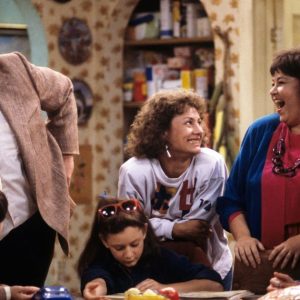- Shock Exit: Eamonn Walker Bids Farewell to ‘Chicago Fire’ After 12 Thrilling Seasons
- Chicago Fire boss hints at Stellaride starting a family in season 13
- Former Chicago Fire star confirms she’d be willing to return in 2025
Roseanne’s Finale: A Polarizing End to a Landmark Series
The Roseanne series finale, marking the end of its revival run, has ignited widespread debate among fans and critics. With unexpected plot twists, notable character absences, and a reshaped narrative, the conclusion has become one of the most controversial moments in television history, raising questions about storytelling, canon, and the challenge of reviving beloved shows.
A Risky Rewrite of History

The finale sought to tie up loose ends while revisiting pivotal moments from the Conner family’s story. However, it shocked viewers by making drastic changes to the original series’ narrative. Storylines that had once defined the show’s heart and humor were reinterpreted or erased altogether, creating a stark contrast with fans’ cherished memories.
While some applauded the writers’ ambition to redefine the series for modern audiences, others felt that the alterations undermined the emotional investment they’d made in the characters over decades. Long-time viewers, who had grown attached to the Conners’ struggles and triumphs, found themselves grappling with the show’s new direction and wondering whether the risks taken were worth the reward.
Missing Faces, Missing Connections
Among the most jarring aspects of the finale was the noticeable absence of key characters. Iconic figures like David (Johnny Galecki) and D.J. (Michael Fishman) were either given minimal screen time or omitted entirely. This departure from the show’s traditionally ensemble-driven storytelling created a sense of imbalance, leaving fans longing for the family dynamics that had always been the backbone of the series.
For many, the absence of these characters wasn’t just a logistical oversight but a deeper symbolic loss. By sidelining fan favorites, the finale inadvertently weakened its emotional resonance, with viewers left to wonder what had become of these beloved personalities and their unfinished arcs.
Canon Controversy: What’s the True Story?

The finale reignited a long-standing debate about canon, especially in long-running series. By rewriting past events and altering key character arcs, the revival posed a philosophical question: does a new iteration of a show have the right to overwrite its original legacy?
For instance, the revision of major relationships and plot points created a divide among fans. Some argued that the revival’s reinterpretations represented a more nuanced, modern take on the Conners’ lives. Others, however, felt that the finale disregarded the emotional weight and continuity of the original series. In their eyes, it wasn’t just a new chapter—it was an erasure of the past.
Navigating Nostalgia and Innovation
The controversy surrounding Roseanne’s finale highlights the inherent tension in reviving a cultural touchstone. Revivals must strike a delicate balance: honoring the original while adapting to contemporary sensibilities. In Roseanne’s case, the revival aimed to explore new storytelling possibilities, but its choices sometimes clashed with audience expectations rooted in nostalgia.
Despite its divisive ending, Roseanne’s contribution to television remains undeniable. As a groundbreaking portrayal of working-class America, the series broke barriers and offered a voice to stories often overlooked on prime-time television. Its candid exploration of family, financial struggles, and resilience remains a hallmark of its legacy, even as debates rage over its concluding chapters.
The End of an Era

Ultimately, Roseanne’s finale serves as a reminder of the challenges and risks involved in reviving a beloved series. The decision to reshape the narrative and omit key characters may not have landed perfectly with all viewers, but it succeeded in sparking a passionate dialogue about the show’s enduring impact.
As fans dissect the finale and its implications, one thing is clear: Roseanne remains a touchstone of American television, sparking conversations not just about its content but about the nature of storytelling itself. While its final moments may have left questions unanswered, its legacy as a bold, unapologetic portrait of family life will continue to resonate for years to come.






